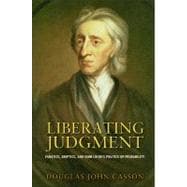
Note: Supplemental materials are not guaranteed with Rental or Used book purchases.
Purchase Benefits
What is included with this book?
| Acknowledgments | p. ix |
| Introduction: The Great Recoinage | p. 1 |
| Unsettling Judgment: Knowledge, Belief, and the Crisis of Authority | p. 23 |
| Certain Knowledge and Probable Belief | p. 25 |
| Unsettling Knowledge | p. 34 |
| Unsettling Belief | p. 41 |
| Abandoning Judgment: Montaignian Skeptics and Cartesian Fanatics | p. 53 |
| Montaigne and the Politics of Skepticism | p. 54 |
| Descartes and the Rationalist Dream | p. 63 |
| Young Locke as Skeptic and Absolutist | p. 75 |
| Reworking Reasonableness: The Authoritative Testimony of Nature | p. 92 |
| The Transformation of a Skeptic | p. 97 |
| Precursors to Lockean Reasonableness | p. 103 |
| From Lecture Halls to Laboratories | p. 114 |
| Forming Judgment: The Transformation of Knowledge and Belief | p. 126 |
| Locke's Political Pedagogy | p. 129 |
| Fanatics and Philosophizers | p. 136 |
| Defining and Redefining Knowledge and Belief | p. 143 |
| Liberating Judgment: Freedom, Happiness, and the Reasonable Self | p. 159 |
| Unrestrained and Restrained Freedoms | p. 160 |
| The Pursuit of True and Solid Happiness | p. 168 |
| The Formation of the Reasonable Self | p. 178 |
| Enacting Judgment: Dismantling the Divine Certainty of Sir Robert Filmer | p. 185 |
| Preaching Patriarcha from the Pulpit | p. 188 |
| Probable Judgment and the Authority of Scripture | p. 192 |
| The Slavishness of Systems | p. 205 |
| Authorizing Judgment: Consensual Government and the Politics of Probability | p. 219 |
| The State of Nature as a Realm of Virtue and Convenience | p. 223 |
| From Moral Clarity to Epistemological Confusion | p. 233 |
| Entrusting Judgment to a Shared Authority | p. 238 |
| Prerogative, Public Good, and the Judgment of the People | p. 244 |
| Conclusion: The Great Recoinage Revisited | p. 253 |
| References | p. 263 |
| Index | p. 279 |
| Table of Contents provided by Ingram. All Rights Reserved. |
The New copy of this book will include any supplemental materials advertised. Please check the title of the book to determine if it should include any access cards, study guides, lab manuals, CDs, etc.
The Used, Rental and eBook copies of this book are not guaranteed to include any supplemental materials. Typically, only the book itself is included. This is true even if the title states it includes any access cards, study guides, lab manuals, CDs, etc.